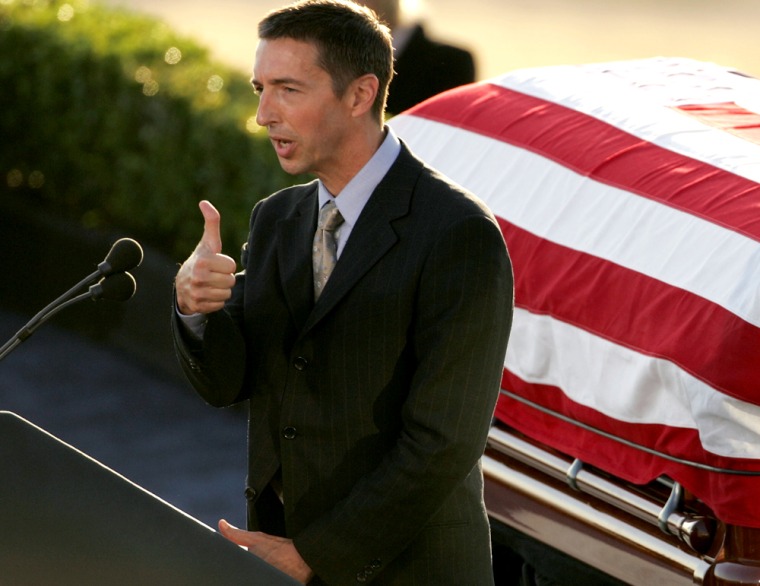The younger son of the late President Reagan will address the Democratic National Convention in Boston about stem cell research.
In an exclusive interview with MSNBC’s Chris Matthews scheduled to air Monday at 7 p.m. ET on MSNBC TV, Ron Reagan said that the speech wasn’t about political one-upmanship. "I won’t be making a political speech," he said. "I think it's important to talk about stem cell research—important to the country and the world. The Democrats support this, and President Bush doesn’t."
Reagan said that Mark Segal of the Democratic party, who is an old friend, approached him about the speech, and that it was a decision he had to think about.
After agreeing, he received a call from John Kerry, who said that if elected, his first act as president of the United States would be an executive order reversing President Bush’s on embryonic stem cell research.
While taping "Hardball," Sen. Orin Hatch (R-Utah), a supporter of stem cell research, pled to Reagan against speaking. Hatch said that his appearance at the Democratic convention politicizes that issue, and could potentially hurt it.
"The people who’ve politicized this the most are the Republicans who are pandering to their base," Reagan said. "If that’s what they’re thinking while I’m talking about stem cell research… then they’re small people."
Of his speech, Reagan says, his main point will be medicine, not politics. "This is a magic moment in medical history. The potential for advance would reshape the way we think about our health and medicine in general."
Reagan says he talked the decision over with his mom Nancy. "She’s okay with it," he says. "She supports the issue and she knows there’s a political aspect to this that we need to be careful of."
Not for public consumption
A few weeks ago, William F. Buckley Jr., an elder statement of the conservative movement, wrote privately to Reagan, an atheist, and accused him of "deriding the faith of your parents."
Buckley, a long-time friend of President Reagan, also claimed to know him better than Reagan’s son. Buckley’s remarks were reprinted publicly today by conservative columnist Robert Novak.
"I’ve known Bill since I was a child," says Reagan. "I’ve admired him for his decency, honesty, and sense of honor. I don’t know why he would give that piece of correspondence to a reporter." Reagan adds that he wrote Buckley back, "but I have no intention of releasing it to the press. He sent me a letter, and I assume these things are private."
While the Bush White House was privately infuriated with Reagan, most Republicans, in the wake of national mourning, offered no response to Ron Reagan’s eulogy or his stance. The irony is that many moderate Republicans agree with the Reagan family on the issue of stem cell research and they are now even angrier President Bush hasn’t change his position to something the Reagans might support.
Stem cell research
Alzheimer's, which President Reagan suffered from, is not one of the diseases that would be amenable to stem cell research. The diseases that stand to benefit include Parkinson's, diabetes, and lymphoma, among others.
Reagan says both he and his mother are advocates for research because they know how these diseases take a toll on loved ones. They also know people who suffer from them. "For people to suggest that she [Nancy] shouldn’t support this because it isn’t Alzheimer's… that’s very small."
"It's hard to say whether stem cell is going to be a vote-changing decision," says Chris Matthews. "For people who have seen loved ones suffer through these diseases and for those whom the research will provide hope—certainly. But a lot of people are going to vote on the economy and the war in Iraq."
Hardball's David Shuster, and the Associated Press contributed to this report.
